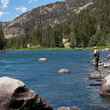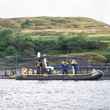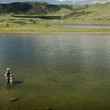After years of tireless advocacy from groups like Trout Unlimited, the Susitna River Coalition and others, the ongoing effort by the Alaskan government to put a mega hydroelectric power dam on the Susitna River has come to an end. Yesterday, Alaskan governor Bill Walker announced that, as part of $1.5 billion in extensive budget cuts, the Susitna-Watana Dam project would be cancelled.
The Susitna is the nation's fourth longest undammed river and is home to Alaska's fourth largest king salmon run. The dam, if completed, would have been the second tallest in the United States.
The dam's construction was expected to produce far reaching negative impacts not only to the Susitna's runs of all five species of pacific salmon and the commercial and sportfishing economies that depend on them, but also to Alaska's hunting and other outdoor tourism industries.
In an era during which there is a growing national and international tide towards dam removal — thanks to the increasingly widely recognized reality that existing dams and hydroelectric power generation projects are not just environmental but also economic losers — the proposal of a new hydroelectric generation project on the Susitna faced strong public opposition from the start.
“As Trout Unlimited has worked to removed dams that don’t make sense throughout the Pacific Northwest, the State of Alaska had been aggressively pursing a proposal that would become the 2nd tallest dam in the United States and would pose significant harmful impacts to the Susitna River’s five species of salmon, caribou migration routes, and tourism and fish-based businesses,” said Sam Snyder, Trout Unlimited Alaska Engagement Director and coordinator of the Save the Susitna campaign. “It’s not hard to ascertain why so many joined together to oppose it.”
It seems certain that, in addition to the work of advocacy groups and the efforts of 13,000 Alaskans that signed a petition saying no to the Susitna Dam, the state's ongoing budget crisis contributed largely to the demise of the dam project that failed to pass basic economic feasibility tests.
In the results of its independent analysis, financial consultation firm Ericsson & Associates, noted that the "Susitna hydro project does not survive any plausible market test, and AEA (Alaskan Energy authority) has acknowledged the project will require additional state aid. How much state support will be needed, and what form it might take, are open questions." The report also noted that the AEA had significantly underestimated the costs of building the dam and that while the precise amount that the project would require in ongoing state assistance was unknown, what was clear was that the "Susitna [hydro project] will require substantial state assistance, draining the treasury of reserves needed to forestall a hard landing for the state budget and economy."
Walker's budget cuts didn't only mark the demise of the Sustina Dam. Walker's $1.5 billion cuts also included cancelation of the Knik Arm bridge megaproject and included a more than 50 percent cut to individual annual payouts from Alaska's Permanent Dividend Fund — a state fund largely built on oil revenues that issues annual dividends to each Alaskan citizen.
The environmental impacts and failures of hydroelectric dams are now widely recognized and, as noted, increasingly so are their economic failures. The fact that the Susitna hydro project failed to pass basic economic tests, eventually falling victim to wide public opposition and its own economic unfeasibility, helps to support the work of environmental, sportsmen and other advocacy groups that challenged the flawed project from the start and who continue to stand against flawed hydro projects elsewhere around the nation.
In response to the news of the Susitna hydro cancellation, Matt Stoecker, co-producer of the documentary DamNation and one of the foremost voices of the dam removal movement noted that, "This is more than a huge win for Alaska. The myth of 'clean' hydropower dams is unravelling. The lack of interest to help fund this project is promising. Alaskans saw through the smoke, rallied together, and saved their river. This decision, and this grassroots success, sends ripples far and wide."






























Comments
Eric Booton replied on Permalink
WOOHOOO! Thanks for sharing the good news. As an angler that calls these waters home I couldn't be more pleased.
Pages